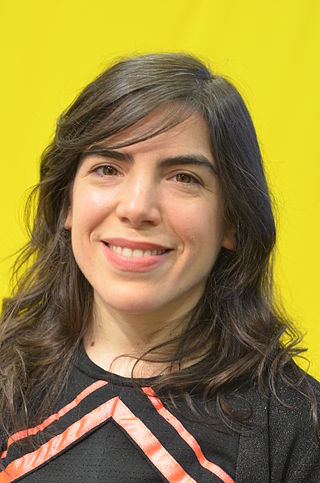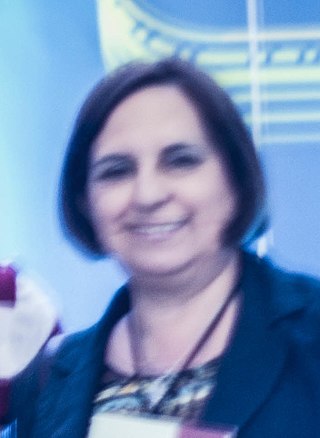
Joaquim Maria Machado de Assis, often known by his surnames as Machado de Assis, Machado, or Bruxo do Cosme Velho, was a pioneer Brazilian novelist, poet, playwright and short story writer, widely regarded as the greatest writer of Brazilian literature. In 1897, he founded and became the first President of the Brazilian Academy of Letters. He was multilingual, having taught himself French, English, German and Greek later in life.

The Hans Christian Andersen Awards are two literary awards given by the International Board on Books for Young People (IBBY), recognising one living author and one living illustrator for their "lasting contribution to children's literature". The writing award was first given in 1956, the illustration award in 1966. The former is sometimes called the "Nobel Prize for children's literature".

Maria Gripe, born Maja Stina Walter, was a Swedish author of books for children and young adults, which were often written in magical and mystical tone. She has written almost forty books, with many of her characters presented in short series of three or four books. For her lasting contribution to children's literature, she received the Hans Christian Andersen Medal for Writing in 1974.
Irene Hunt was an American children's writer known best for historical novels. She was a runner-up for the Newbery Medal for her first book, Across Five Aprils, and won the medal for her second, Up a Road Slowly. For her contribution as a children's writer she was U.S. nominee in 1974 for the biennial, international Hans Christian Andersen Award, the highest international recognition available to creators of children's books.

Virginia Esther Hamilton was an American children's books author. She wrote 41 books, including M. C. Higgins, the Great (1974), for which she won the U.S. National Book Award for Young People's Literature and the Newbery Medal in 1975. Her works were celebrated for exploring the African-American experience, what she called "Liberation Literature."

Marisol Misenta, known professionally under the mononym Isol, is an Argentine creator of children's picture books and a pop singer. For her career contribution to "children's and young adult literature in the broadest sense" she won the Astrid Lindgren Memorial Award from the Swedish Arts Council in 2013, the biggest prize in children's literature.

Suzy Lee is a Korean picture-book illustrator and author. She is critically acclaimed as an artist who explores the pleasures and tensions that lie between reality and fantasy. She is also known for her remarkable achievements in the field of wordless picture books, or silent books. She gained global attention for her three works – Mirror (2003), Wave (2008), and Shadow (2010), known collectively as "The Border Trilogy" – using the center binding of the pages of a book as a means to create a narrative crossing the boundaries between reality and fantasy. Wave and Shadow were respectively named by The New York Times as Best Illustrated Children's Books of 2008 and 2010. Wave was also awarded the gold medal for Original Art by the Society of Illustrators in 2008. In 2016, Suzy Lee was shortlisted for the Hans Christian Andersen Award, regarded as the Nobel Prize for children's literature, an award which she received in 2022. Lee has received a number of other prestigious awards from around the world including the FNLIJ Award Luís Jardim for the Best Book without Text in 2008 and the Boston Globe-Horn Book Award for Excellence in Children's Literature in 2013.

Lygia Bojunga is a Brazilian writer of children's books under the name Lygia Bojunga Nunes. She is one of four people to win the two major international awards: for "lasting contribution to children's literature", she received the Hans Christian Andersen Medal in 1982. For her career contribution to "children's and young adult literature in the broadest sense" she won the Astrid Lindgren Memorial Award in 2004.
Júlio Afrânio Peixoto was a Brazilian physician, writer, politician, historian, university president, and pioneering eugenicist. He held many public offices, including Brazilian congressional representative from Bahia in the federal Câmara de Deputados (1924–1930), first the president of the Universidade Federal do Rio de Janeiro, member of the Brazilian Cultural Center in the United States, president of the Academia Brasileira de Letras, and honorary doctorates from Coimbra University and the University of Lisbon, Portugal.

Socorro Acioli was born in Fortaleza, Ceará, in 1975. She is a journalist, has a master's degree in Brazilian literature and is currently following a PhD. in Literary Studies at the Universidade Federal Fluminense, Rio de Janeiro. She started her career in 2001 and since then has published books of various genres, such as biographies Frei Tito (2001) and Rachel de Queiroz (2003), children’s short stories and youth novels. In 2006, she was selected to take part in a workshop called ‘How to tell a tale’, conducted by the Nobel Prize Winner Gabriel García Márquez at the San Antonio de Los Banõs International Film and Television School, Cuba. The author was selected by García Márquez himself based on the synopsis of the novel A cabeça do santo/The Head of the Saint, which was published in the UK in 2014 and in the US in 2016. In 2007, she was a visiting researcher at the International Youth Library in Munich, Germany. She has also given lectures in several countries such as Portugal, Bolivia and Cape Verde. Mrs. Accioli is also a translator, essayist and literary theory teacher.
Lúcia Benedetti – was a Brazilian storyteller, writer of Children's Literature, novelist, playwright, chronicler and translator.

Ndalu de Almeida is a writer born in Angola who uses the pen name Ondjaki. He has written poetry, children's books, short stories, novels, drama and film scripts.

Adriana Lisboa is a Brazilian writer. She is the author of seven novels, and has also published poetry, short stories, essays, and books for children. Originally written in Portuguese, her books have been translated into more than a dozen languages. Crow Blue is Lisboa's most recent novel translated into English and was named a book of the year by The Independent (London). Her stories and poems have appeared in Granta, Modern Poetry in Translation, The Brooklyn Rail, Litro, The Missing Slate, Joyland, Sonofabook, Waxwing, and others.
José María Sánchez-Silva y García-Morales was a Spanish writer. He received the Hans Christian Andersen Medal in 1968 for his contribution to children's literature. He is best known for his novel Marcelino Bread and Wine (1953) which was filmed in 1955, as Miracle of Marcelino.

Maria Teresa Andruetto is an Argentine writer. She has written poems, novels, drama and children's books. For her "lasting contribution to children's literature" she received the biennial Hans Christian Andersen Medal in 2012.

Alicia Morel Chaigneau was a Chilean writer, novelist, storyteller, poet, and essayist best known for her work in the field of children's literature and theater for children and puppets.

Silviano Santiago is a Brazilian writer, literary critic, essayist and scholar.

María Cristina Ramos is an Argentine writer and educator. Known primarily for her children's books, she was awarded the SM Ibero-American Prize for Children's and Youth Literature in 2016. In 2020, she was named a finalist for the Hans Christian Andersen Award.

Zohreh Ghaeni is a Children's literature expert, translator, lecturer, researcher and historian. She is the co-writer of the 10-volume research book on the History of Children's Literature in Iran. She is the head of the Read with Me project. She also served as the IBBY Executive committee member from 2016 to 2020.

María José Ferrada is a journalist and writer from Chile. She has written numerous books for children and young adults in the Spanish language, and her work has been widely translated. She has received multiple awards for her work, including the Premio Academia of the Academia Chilena de la Lengua, and the Literary Prize of the City of Santiago, and her books for children have been published in several countries, including Spain, Argentina, Colombia, Brazil, Mexico, Italy and the United States, in addition to Chile. She is currently the editor of Chile para Niños, which is the National Library of Chile's digital resource center for children.
















